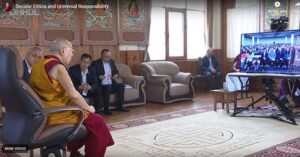 His Holiness the Dalai Lama expressed his views on the importance of secular ethics and the enduring ties between the Chinese and Tibetan people at an event hosted by the Office of Tibet at the Tibetan Community Centre, Phuntsok Deshe in Queens, New York. From his residence in the Tibetan Monastery of Bodh Gaya in Bihar, via video conference facilities, His Holiness spoke to an American audience of mostly Tibetan and Chinese students living in and around New York City.
His Holiness the Dalai Lama expressed his views on the importance of secular ethics and the enduring ties between the Chinese and Tibetan people at an event hosted by the Office of Tibet at the Tibetan Community Centre, Phuntsok Deshe in Queens, New York. From his residence in the Tibetan Monastery of Bodh Gaya in Bihar, via video conference facilities, His Holiness spoke to an American audience of mostly Tibetan and Chinese students living in and around New York City.
The talk began with the Dalai Lama addressing the lack of education about inner values and mental well-being in modern education systems. He stressed that ancient Indian knowledge about mindfulness and the handling of emotions should be regarded as an element of psychology, and more appropriately as a knowledge base for universal use, regardless of religious tradition. Hygiene of one’s mind should be held in similar regard to hygiene of one’s body. A form of universal secular ethics can be used to foster a wider sense of community and a global responsibility, not through private prayer but through education.
His Holiness went on to discuss the long ties between Tibet and China, alluding to the 641 CE union of Princess Wencheng to Tibetan Emperor Songtsen Gampo and a time where China was historically a Buddhist nation. He mentioned that such enduring ties between Tibet and China make them brothers and sisters, the differences between them being more recent and essentially political.
“Now things are changing.” said His Holiness, regarding Tibetan–Chinese relations; saying he feels that top Chinese officials are in consideration of a more “realistic approach”, rather than hard-liner policies against Tibet. He also expressed his long desire to one day make a pilgrimage to spiritual sites in China.
The gathering concluded with a Q&A session where enquiries from the student participants were put to the Dalai Lama. When asked about the likelihood of his reincarnation, His Holiness indicated that Buddhist teachings do not depend on the institution of the Dalai Lama and that the matter of its continuation is up to the Tibetan people upon his death. He continued to convey that universal responsibility should replace otherwise short-sighted national interests.
** Building on Lha’s Secular Ethics Fellowship earlier this year, we have commissioned a series of articles looking at different aspects of Secular Ethics, leading up to a research project next spring which will look at the education aspects in more depth and at what is happening in the schools in Dharamshala. Look out for our follow up articles in the coming months by Okechukwu, our volunteer who’s interest in Secular Ethics has led to his offer to look at how it is being received in various locations, and how the students and educators feel about its inclusion in the curriculum. Find the articles on our Secular Ethics page.




 Print
Print Email
Email